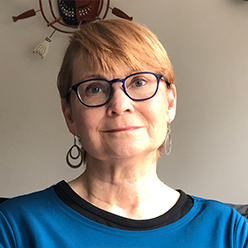
By Sheila Wickouski
The Arena Stage 2022-23 theater season starts off with a Philip Barry’s classic rom-com Holiday which runs from October 7 to November 6.
Almost 100 years old, this glittering story of opposing societal hierarchies and differing views of success is still a timely commentary on what is a life worth living and is packed with plenty to say to 21st century audiences.
Director Anita Maynard-Losh is well known in Southwest as both a neighbor and as the director of community engagement and senior artistic advisor at Arena Stage, where she leads the theater’s education and outreach programs and serves on the artistic team.
Maynard-Losh answered questions for The Southwester ahead of the show’s opening.
The Southwester: This is your 19th season at Arena Stage, where you have been involved in an artistic capacity on 45 stage productions. Why is Holiday a special one for you?
Anita Maynard-Losh: I fell in love with the play Holiday when I was 15 years old, and I still have the battered copy of the play that I bought then in a used bookstore in San Francisco, my home town. I also enjoyed the 1938 film of Holiday starring Cary Grant and Katharine Hepburn, although it is different in several ways from the play.
SW: Holiday spans an interesting time in American history.
AML: The play was written (and performed) in 1928 before the stock market crash, and has the energy and ebullience of the Roaring Twenties, while the1938 film was made and set ten years later, after the country had experienced the Great Depression, so the costumes and tone reflect that.
SW: What is it about Holiday that is still relevant today?
AML: Holiday is a romantic comedy with sparkling dialogue and beautiful period costumes. There are underlying questions in the play about the choices we make in our lives. But questions like: Am I living the kind of life I want to live? Am I following my own dreams or just doing what is expected of me? These are questions that many people are exploring now, after dealing with the pandemic.
SW: What are the challenges in adapting a play written nearly 100 years ago now with the changes in society?
AML: We are working on the play as a period piece set in 1928, but of course a play reflects not only the time it was written or set but also the time it is performed. So while there may be differences in casting or how some lines are interpreted, the main “adapting” happens in the minds and hearts of the contemporary audience as they bring the context of their lives and experiences to the theater.
SW: Tell us about the actors for this production.
AML: We have a terrific company of fourteen performers that is made up of actors from the DMV as well as New York. They all bring something special to the table and are generously sharing it as we work together. We also have fabulous designers and consultants, and the unmatched artistry of the Arena Stage staff that work in costumes, props, lighting, sound and more. I have known some of the folks working on the show for more than twenty years!
SW: Is there anything special you want to mention or comment on?
AML: I’m a resident of Southwest, so I am excited that so many of my neighbors will be able to see this play that I fell in love with years ago! And it’s like completing a circle to have the opportunity to direct Holiday now, after my long relationship with the play.
SW: This is an historic year for Arena Stage in so many ways. American Prophet was finally on stage after a long delay and this is Molly Smith’s 25th anniversary and she will be retiring as Artistic Director. What should people remember about the theater’s history and what will be Molly Smith’s legacy?
AML: Molly Smith and I have been friends and colleagues for more than forty years, and I am in awe of all that she’s accomplished. Arena Stage has always been a pioneer in the American theater, and Molly, coming from Alaska, was the perfect person to lead the theater over the last 25 years. She focused the theater’s artistic eye on American artists and American work, commissioned many important new plays from diverse playwrights, built the Mead Center for American Theater here in Southwest, transformed representation and inclusion onstage and off, and led the theater through many of the difficult times we’ve experienced in the last quarter century, from 9/11 to the pandemic. All while remaining an innovative and gifted artist in her own right. In addition, over the many years we’ve known each other we have shared many of life’s highs and lows, and so I can also say that she is a terrific friend!

